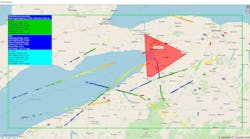Officials of the U.S. Defense Advanced Research Projects Agency (DARPA) will conduct industry-day briefings for the Molecular Informatics project via Webcast from 1 to 3 p.m. eastern time on Friday 7 April 2017.
The Molecular Informatics program seeks to develop and test completely new approaches to store and process information with molecules, DARPA officials say. This will require experts from chemistry, computer and information science, mathematics, and chemical and electrical engineering.
Data storage and processing is central to U.S. Department of Defense (DOD) activities across areas like platform design and optimization, sensing, mission planning and logistics, and health care.
While current computational architectures remain essential, new complementary approaches are necessary to provide advanced capabilities as the complexity and volume of data grows, DARPA researchers say.
Related: Security and solid-state media driving data storage
Chemistry offers a yet-untapped rich palette of molecular diversity that could be harnessed for scalable information storage and processing, experts say.
By manipulating properties such as structure, size, charge, and polarity, researchers may develop a vast design space enabling dense data representations and highly versatile computing concepts that operate outside of the traditional digital and logic-based approach.
The Molecular Informatics program seeks to answer questions such as:
-- how and what can we encode in molecules?;
-- what types of operations can molecules execute?;
-- what are the representational abstractions, mathematical or computational primitives, that can describe these operations?;
-- what does ‘computation’ mean in a molecular context?;
-- what functions can be decided via molecular means and what equivalence might they have to traditional computing methods?; and
-- can we design approaches to compute directly on and with molecular data?
By addressing a series of mathematical and computational problems with molecule-based information encoding and processing, Molecular Informatics will discover and define future opportunities for molecules in information storage and processing.
Related: Harvard cracks DNA storage, crams 700 terabytes of data into a single gram
A formal solicitation for the DARPA Molecular Informatics program will be released in early April. DARPA Researchers are encouraging participation by non-traditional proposers such as small businesses, academic and research institutions, and first-time government contractors.
Those interested must register for the Molecular Informatics industry-day Webcast no later than 31 March 2017 online at https://events.sa-meetings.com/ereg/newreg.php?eventid=238659&&.
Companies interested also may email company profiles for teaming purposes to DARPA no later than 11 April 2017 at [email protected].
Email questions or concerns to DARPA's Anne Fischer, the Molecular Informatics program manager, at [email protected]. More information is online at https://www.fbo.gov/spg/ODA/DARPA/CMO/DARPA-SN-17-33/listing.html.
Learn more: search the Aerospace & Defense Buyer's Guide for companies, new products, press releases, and videos



